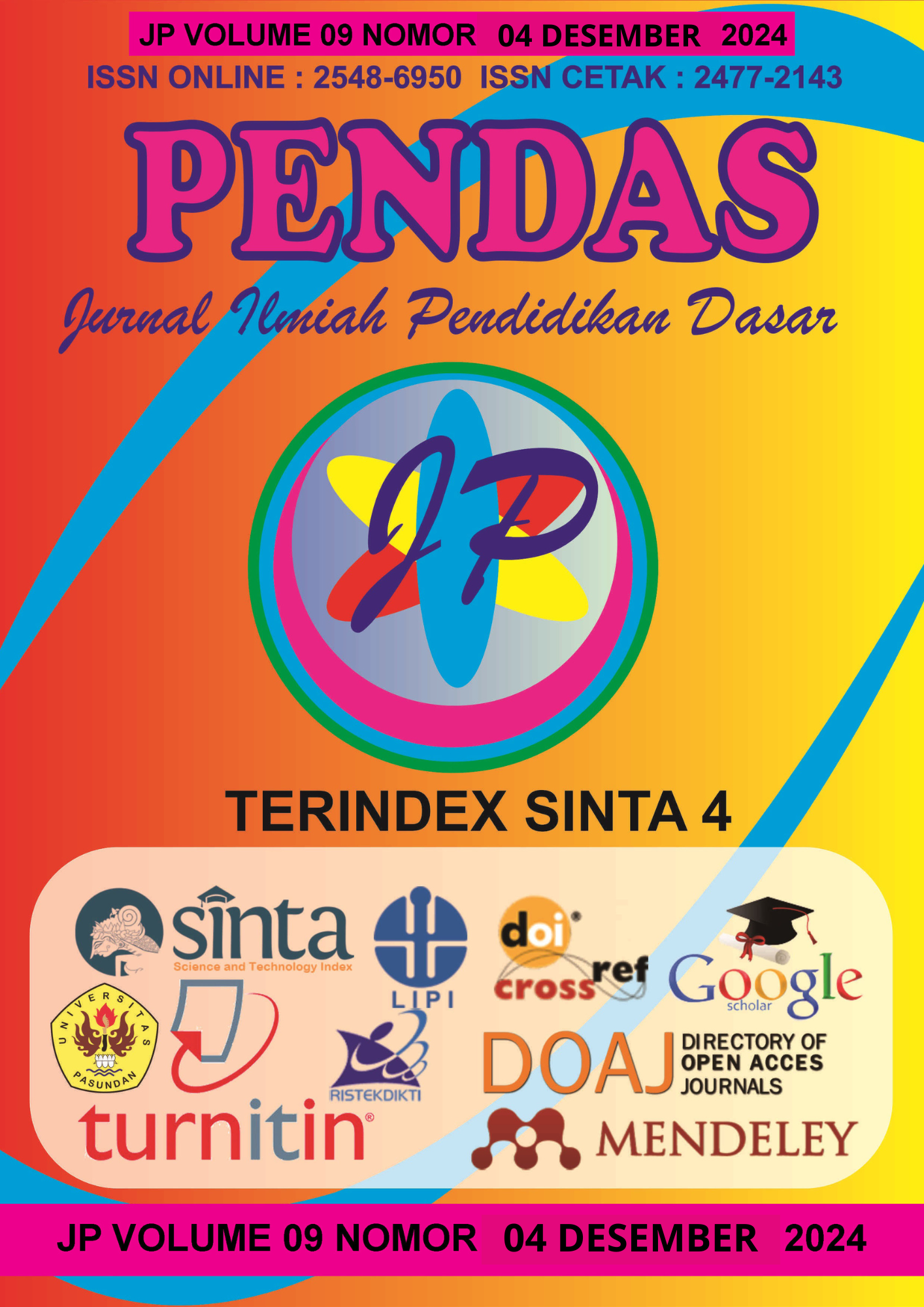IMPLEMENTATION OF THE SEKOLAH PENGGERAK PROGRAM IN STRENGTHENING THE PROFESSIONALISM OF EDUCATORS AT SD NEGERI 1 BRINGINSARI
DOI:
https://doi.org/10.23969/jp.v9i04.20246Keywords:
Program Sekolah Penggerak, Professionalism, Planning, Implementation, CIPPAbstract
The Program Sekolah Penggerak is designed to comprehensively improve student learning outcomes, with a primary focus on human resource development. With high-quality human resources, it is expected that all interventions under this program can be optimally implemented. This evaluation study focuses on SD Negeri 1 Bringinsari, which has implemented the Program Sekolah Penggerak in its school.This study uses a qualitative approach and was conducted at SD Negeri 1 Bringinsari, Sukorejo Subdistrict, Kendal Regency. Data were collected through interviews, observations, and documentation. The data analysis techniques employed include data condensation, data presentation, and conclusion drawing. The validity of the study was tested using triangulation.The research findings indicate that the planning of the Program Sekolah Penggerak at SD Negeri 1 Bringinsari was carried out comprehensively, involving goal setting, program design, and resource identification. The implementation of the program adhered to the predetermined guidelines. The evaluation of the program, using the CIPP model, demonstrates that the program's context, input, process, and product aspects were effectively executed. The context evaluation revealed the readiness of elements influencing the program's success. The input evaluation assessed the Kurikulum Merdeka (Independent Curriculum) as aligned with educational advancements. The process evaluation examined the success of planning, implementation, and evaluation stages. The product evaluation showed excellent achievements in each stage of the program, both managerially and evaluatively. Through strong commitment and confidence between the principal and educators, SD Negeri 1 Bringinsari, located in a remote area, successfully completed the Program Sekolah Penggerak. The results of this study show that all evaluated aspects met the established objective standards. Detailed and comprehensive information about the program facilitated the assessment of managerial effectiveness and the identification of improvement actions for the next program cycle.
Downloads
References
Abidah. A. H N Hidaayatullaah, R M Simamora, D Fehabutar, L Mutakinati, & N Suprapto. 2020. The Impact of Covid-19 to Indonesian Education and Its Relation to the Philosophy of Merdeka Belajar. Studies in Philosophy of Science and Education (SiPoSE). 1(1): 38-49.
Aisam, Sulafah Fathin Khannanah, & Lita Juniati. 2022. “Implementasi Kebijakan Program Merdeka Belajar (Studi Pada Guru Penggerak di SDN Pisang Candi 4 Kota Malang).” Journal on Education 5, no. 1: 1284–94.
Amani, N. K. 2022. Mengenal Kurikulum Merdeka Belajar, Karakteristik Hingga Kriteria Umum. liputan6.com.
Aulia, Maryam, Misnawati Misnawati, Apritha Apritha, Reni Adi Setyoningsih, Putri
Bayumie, S. 2020. Menakar Konsep Merdeka Belajar.
Creswell, Jhon W. 2019. Research Design Pendekatan Kualitatif, Kuantitatif, dan. Mixed. Yogyakarta: Pustaka Pelajar.
Danim, Sudarwan. 2012. Visi Baru Manajemen Sekolah: dari Unit Birokrasi ke Lembaga Akademik. Jakarta: Bumi Aksara.
Fitriyah, Chumi Zahroul & Rizki Putri Wardani. 2022. “Paradigma Kurikulum Merdeka Bagi Guru Sekolah Dasar.” Scholaria: Jurnal Pendidikan Dan Kebudayaan 12, no. 3: 236–43.
Hulu, Doni Berkat Tabah, Alianus Zalukhu, Herman Herman, Nesti Surya Astuti Zebua, Dame Ifa Sihombing, & Simon M. Panjaitan. 2023. “Kesiapan Belajar Jenjang Sekolah Menengah Atas (SMA) Dalam Implementasi Kurikulum Merdeka (IKM) Di Kabupaten Nias Utara.” Journal on Education 5, no. 3: 6040–46.
Reza, Ananto. 2014. Analisi Pengaruh Gaya Kepemimpinan, Motivasi dan disiplin Kerja terhadap Kinerja Pegawai (Studi Empiris pada PT DHL Forwarding Semarang Branch. Semarang: Universitas Diponegoro Semarang.
Rusman. 2014. Model-Model Pembelajaran Mengembangkan Profesionalisme. Guru Edisi Kedua. Jakarta: PT Raja Grafindo Persad
Sagala, Syaiful. 2016. Administrasi Pendidikan Kontemporer. Bandung: Penerbit Alfabeta
Sanjaya, W. 2016. Strategi Pembelajaran. Prenadamedia Group, Jakarta Setyawan, Bambang. 2022. “Peran Guru Bk Dalam Mengimplementasikan Disiplin Positif.” Prosiding Konseling Kearifan Nusantara (KKN) 2: 400–404.
Suwantoro. 2021. Kesiapan Sekolah Dalam Menerapkan Kebijakan Merdeka Belajar di Masa Pandemi. In D. Adi Wijayanto (Ed.), Waktunya Merdeka Belajar. Akademia Pustaka.
Syafi‟i, Fahrian Firdaus. 2022. “Merdeka Belajar: Sekolah Penggerak.” In Prosiding Seminar Nasional Pendidikan Dasar.
Tjalla, Awaluddin, Tsulistia Poetry Hendrawan, & Zulfa Saleh. 2022. “Implementasi Pendekatan Humanistik Dalam Pembelajaran Serta Penerapanya Dalam Layanan Bimbingan dan Konseling Di Sma Muhammadiyah 11 Jakarta.” Jurnal Mahasiswa BK An-Nur: Berbeda, Bermakna, Mulia 8, no. 3: 158–63.
Ulfa, Rafika. 2021. “Variabel Penelitian Dalam Penelitian Pendidikan.” AL- Fathonah 1, no. 1.
Usman, Husaini. 2015. Manajemen: Teori, Praktik dan Riset Pendidikan. Jakarta: Bumi Aksara
Downloads
Published
Issue
Section
License
Copyright (c) 2025 Pendas : Jurnal Ilmiah Pendidikan Dasar

This work is licensed under a Creative Commons Attribution 4.0 International License.



















